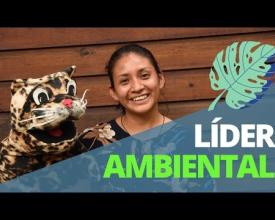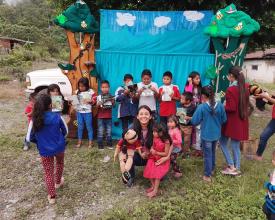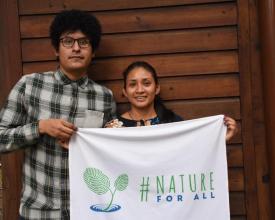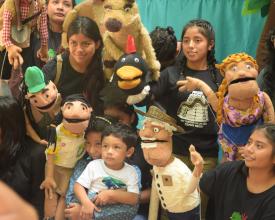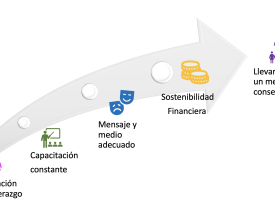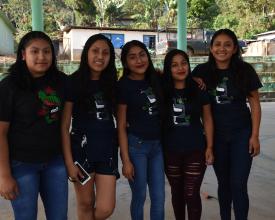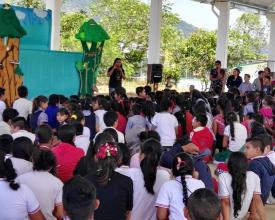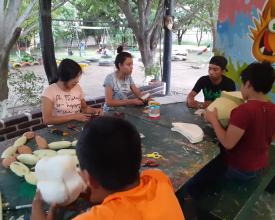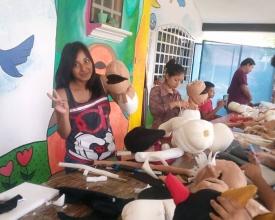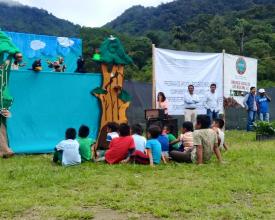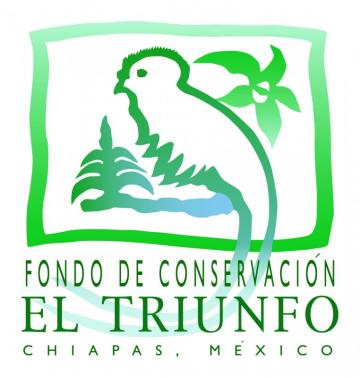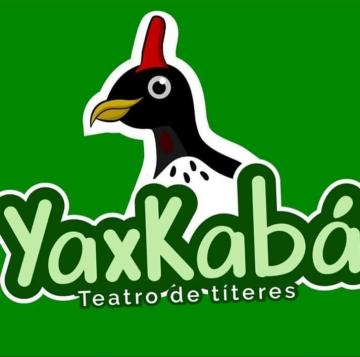
Yaxcabá: Puppet theatre as an environmental strategy in remote communities
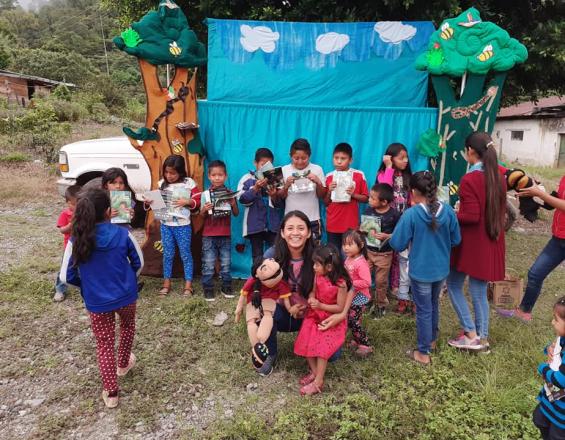
Young people in the rural areas of El Triunfo do not have real opportunities for development, and most of them migrate or start a family at an early age. These communities, as they are located within a biosphere reserve, are visited by environmental education groups, generally from the city of Tuxtla, with high transportation and logistics costs. The YAXCABÁ Group is an alternative to the two challenges mentioned; on the one hand, it is a local group of young people who, through puppet theatre, produce environmental education works and bring conservation stories to children and adults in the El Triunfo Biosphere Reserve in an efficient and effective way; and on the other hand, they provide a development alternative for creative young people in the region.
Yaxcabá is a clear example of how a group of young people have succeeded in transforming themselves, overcoming obstacles, and through theatre and entertainment, mobilizing people and changing behaviour to preserve one of the most biodiverse regions on earth.
Context
Challenges addressed
- Young people are among the most vulnerable populations in rural communities in protected areas, because they have no land and have no opportunities for development. Most of them migrate to cities or to the U.S.A, risking their lives in the process. Girls who stay behind get pregnant at a very young age (13 or 14) and this accelerates the cycle of poverty. There is a lot of talent in young people and a great desire to contribute to the welfare of their community and the natural protected area where they live, but they do not have the skills or opportunities to do so.
- Environmental education in the communities within a natural protected area is one of the primary activities to ensure the conservation of the site. However, in the case of El Triunfo, this activity involves a very high cost because it is not easy to access the 34 communities that live in the reserve, especially if those who carry out activities come from the state capital.
Location
Process
Summary of the process
The leadership opportunities and training allow young people to develop projects that in turn can be offered to different organizations who pay for that service. These new resources generated then help grow the theater, both in skills and infrastructure, allowing the youth to be able to reach more communities.
Building Blocks
Leadership Training
It is essential that the group has a leader who organizes and inspires young people to join the puppet program. The success of each activity depends on the leader being able to motivate his or her team, constantly innovate and seek growth opportunities for all.
Enabling factors
1. Parental support. Some of these children are minors and without parental support it is difficult to form a group.
2. Support should be provided by organizations that are willing to support the leaders of each theatre group. The young people of Yaxcabá have previously participated in personal training programs offered by organizations working in the area.
Lesson learned
Age is not an impediment, and in the case of rural communities, children are forced to grow and mature much faster than in cities.
The right message through the right medium
Puppet theatre allows the group to create fun stories, appropriate to the reality of the communities, which clearly identify a problem and propose a solution. The plays combine entertainment with education, the messages are clear, and the theatre is a medium for that message to reach children and adults. In addition, at the end of the play, educational materials are distributed so that the message is not forgotten.
Enabling factors
1. Have a clear understanding of the problems of the communities.
2. Receive the help of professionals who will allow young people to improve their skills so that they can relay an appropriate message.
3. Follow-up teaching materials.
4. Coordination with institutions.
Lesson learned
Problems that can be very complicated to deal with become simpler if they are presented in a theatrical way.
The performances are for children, but the children bring their parents and the children talk about what they saw with the adults in their homes, so the message spreads far beyond the play that was performed.
Peer-to-peer communication has a greater impact. The messages are presented by people in the community, who are young people who are familiar with their reality and who use the same language.
Ongoing training
This program requires ongoing training. In addition to personal growth issues, training sessions include identifying problems, creating a script, developing a theatrical production, creating puppets, and holding acting classes.
Enabling factors
1. The support of non-governmental organizations, in this case FONCET and Vientos Culturales, has been key to the creation of the group.
2. The willingness of young people to continue learning and to constantly seek to have new works to bring new messages to the communities.
3. Correct information: The plays combine fun and entertainment with education, and it is important that the educational part is true in order to educate correctly, so the support of experts is required.
Lesson learned
It is important to make alliances with organizations as there are different training sessions for different topics and you have to be willing to work with two or more organizations and learn the best from each one of them.
Financial sustainability
The plays that are performed in the communities are paid for by organizations that require environmental education projects, and these same plays can be sold to municipalities or schools that require performances on specific days, or even at birthday parties. Environmental education becomes self-employment for the young people in the group.
Enabling factors
1. To know clearly how much it costs to bring a production to each community and to have a competitive but sustainable cost.
2. To have a good repertoire of works to offer different clients.
3. Training in management issues.
Lesson learned
It is much cheaper for institutions, schools and governments to have a local theatre group that can put on educational plays instead of having to hire people from outside. The communities are very remote and the highest costs are for the logistics of getting people there. This theatre group is located in the region, so their service is highly competitive. In order to keep growing it is important to have a legal status and it is necessary to seek support.
Impacts
- 5 young self-employed members of Yaxcabá.
- More than 2,000 children who have received a conservation message.
- Construction of a library in the neighbourhood of Puerto Rico.
Beneficiaries
- 5 young self-employed members of Yaxcabá.
- More than 2,000 children who have received a conservation message.
- More than 100 children with access to a library.
Sustainable Development Goals
Story
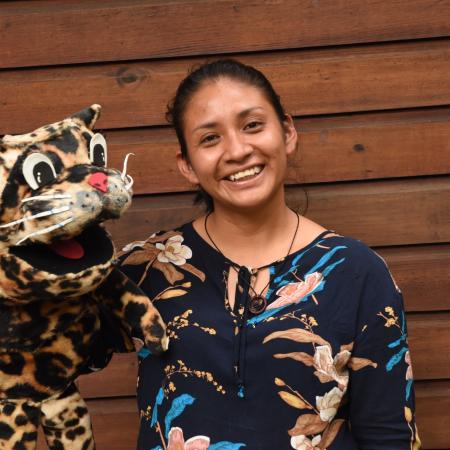
One way or another, all of us can make a contribution. For Sandra Anahí Perez, this is key. She is a young person who despite her impoverished state and the few opportunities she had, has fortunately managed to live within the El Triunfo Biosphere Reserve, the most enchanting forest in the world. This love for the location in which she lives is shown and communicated by here every day.
She belongs to the Yaxcabá group, who through a puppet theatre relays a message of love of nature. People are made to reflect through the laughter and stories of their theatrical works. After just three years, their performances have reached over 2,000 children in the most remote communities of the Sierra de Chiapas.
Sandra and her Yaxcabá group are a clear example of love for nature and of #NatureForAll, a global movement whose mission is to inspire love for nature.

